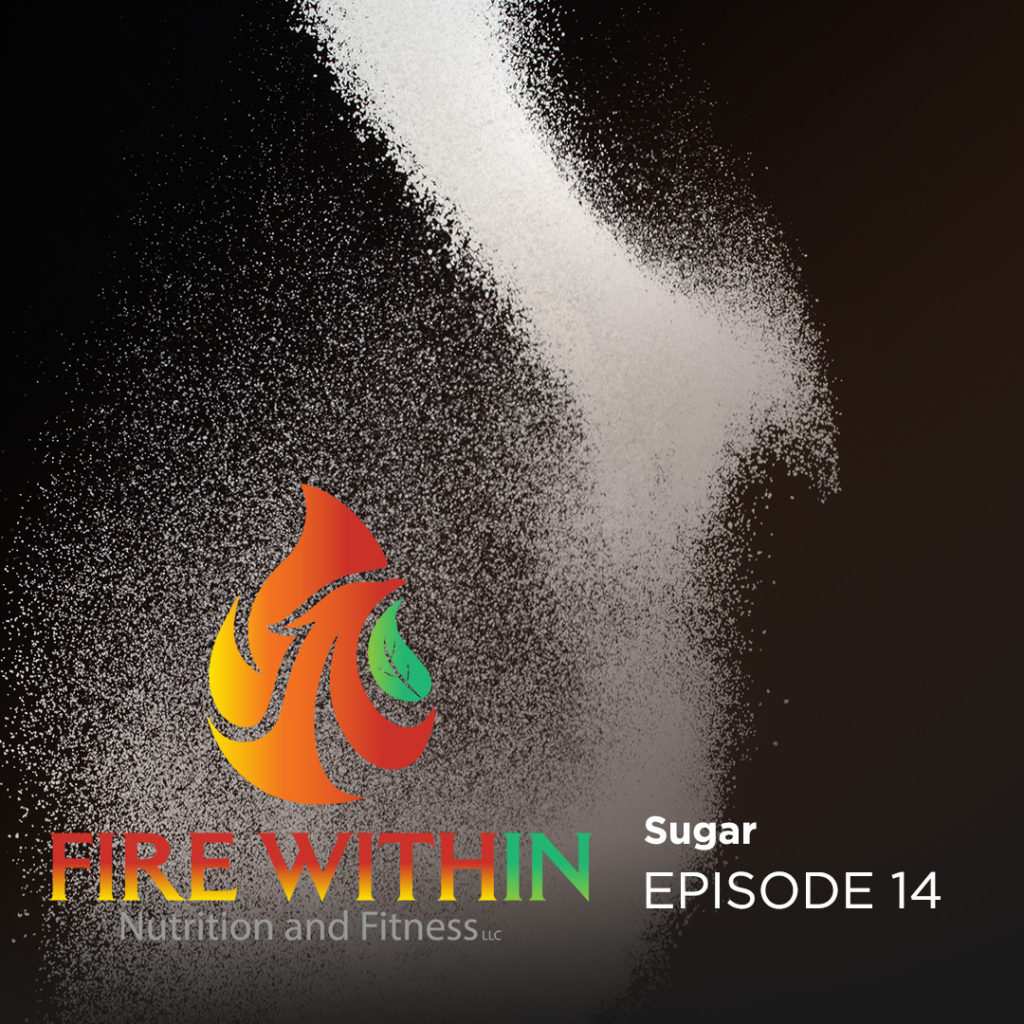Sugar. Yes Please. Is all sugar bad? What about sugar found in fruit or juice. Want to get a scientific understanding of the role of sugar in your body and what types to avoid and which to consume to fuel your life. Sugar is the most addictive substance on the planet and the topic of today’s podcast.
Brandon Woolley of the Fire Within Podcast has created many seminars as a personal trainer and speaker. Today’s episode is based on one of his more popular topics. Sugar.
Sugar is the most addictive substance on the planet. Sugar is so addictive that rats given a choice between sugar or cocaine will choose sugar. (and rats really like cocaine)
Types of sugar found on ingredient labels:
1. Agave Nectar
2. Barley Malt
3. Beet Sugar
4. Brown Sugar
5. Buttered Syrup
6. Cane Crystals
7. Cane Juice Crystals
8. Cane Sugar
9. Caramel
10. Carob Syrup
11. Castor Sugar
12. Confectioner’s Sugar
13. Corn Sweetener
14. Corn Syrup
15. Corn Syrup Solids
16. Crystalline Fructose
17. Date Sugar
18. Demerara Sugar
19. Dextran
20. Dextrose
21. Diastatic Malt
22. Diatase
23. Ethyl Maltol
24. Evaporated Cane Juice
25. Fructose
26. Fruit Juice
27. Fruit Juice Concentrates
28. Galactose
29. Glucose
30. Glucose Solids
31. Golden Sugar
32. Golden Syrup
33. Granulated Sugar
34. Grape Sugar
35. High-Fructose Corn Syrup
36. Honey
37. Icing Sugar
38. Invert Sugar
39. Lactose
40. Malt Syrup
41. Maltodextrin
42. Maltose
43. Maple Syrup
44. Molasses
45. Muscovado Sugar
46. Panocha
47. Raw Sugar
48. Refiner’s Syrup
49. Rice Syrup
50. Sorbitol
51. Sorghum Syrup
52. Sucrose
53. Sugar
54. Syrup
55. Treacle
56. Turbinado Sugar
57. Yellow Sugar
To name a few.
Fruits used to be rare and seasonal, now they are available all year long from every corner of the globe. A good recommendation is to eat fruits that are in season.
Domestication and change of jobs resulted in a loss of brain volume in humans that equal the size of a tennis ball.
Fructose is the most efficient sugar at creating lipogenesis -double the amount of fat in the liver as table sugar -after it fills the liver, it spills into the bloodstream as triglycerides.
-While fructose doesn’t immediately cause a rise in blood sugar, frequent consumption causes blood sugar to rise due to stress on the liver-This impairs the ability of cells to suck up glucose from the blood. -This was a helpful adaptation during a famine. But not needed today.
The process of making Foie Gras: Similar to humans, ducks and geese are able to store massive amounts of fat in their liver which is what allows them to sustain such long flights Tubes are inserted into healthy geese and ducks force-feed them grain, usually corn, which is far more carbs than they would consume in a natural setting. Their livers can grow up to 10 times normal size-from fat, so severely enough to inhibit blood flow and increases abdominal pressure, hindering the animal from breathing and sometimes causing organs to rupture from the stress.
The process of making Foie Gras sounds inhumane but unfortunately, we are doing the same thing in our bodies when we consume the Standard American Diet (SAD). We are quite literally making human Foie Gras.
The best way to avoid it is to stick to whole, unprocessed foods.
It is a good idea to limit fruit, wheat, grain, and corn consumption.
Blueberries and other berries are the best choices for fruit and even prevent brain aging.
Foods that are so poor in nutrients and quality that extra vitamins must be put back in them, are not fit to eat.
Sugar, especially fructose are one of the main contributors to aging, Alzheimer’s and dementia.
Lack of nutrients causes the body to stop long term repair such as DNA repair.


